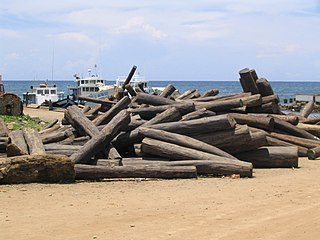Related Research Articles

Environmental laws are laws that protect the environment. Environmental law is the collection of laws, regulations, agreements and common law that governs how humans interact with their environment. This includes environmental regulations; laws governing management of natural resources, such as forests, minerals, or fisheries; and related topics such as environmental impact assessments. Environmental law is seen as the body of laws concerned with the protection of living things from the harm that human activity may immediately or eventually cause to them or their species, either directly or to the media and the habits on which they depend.

The United Nations Economic Commission for Europe is one of the five regional commissions under the jurisdiction of the United Nations Economic and Social Council. It was established in order to promote economic cooperation and integration among its member states.

The International Union for Conservation of Nature (IUCN) is an international organization working in the field of nature conservation and sustainable use of natural resources. Founded in 1948, IUCN has become the global authority on the status of the natural world and the measures needed to safeguard it. It is involved in data gathering and analysis, research, field projects, advocacy, and education. IUCN's mission is to "influence, encourage and assist societies throughout the world to conserve nature and to ensure that any use of natural resources is equitable and ecologically sustainable".

The Ramsar Convention on Wetlands of International Importance Especially as Waterfowl Habitat is an international treaty for the conservation and sustainable use of Ramsar sites (wetlands). It is also known as the Convention on Wetlands. It is named after the city of Ramsar in Iran, where the convention was signed in 1971.

The International Chamber of Commerce is the largest, most representative business organization in the world. ICC represents over 45 million businesses in over 170 countries who have interests spanning every sector of private enterprise.

Illegal logging is the harvest, transportation, purchase, or sale of timber in violation of laws. The harvesting procedure itself may be illegal, including using corrupt means to gain access to forests; extraction without permission, or from a protected area; the cutting down of protected species; or the extraction of timber in excess of agreed limits. Illegal logging is a driving force for a number of environmental issues such as deforestation, soil erosion and biodiversity loss which can drive larger-scale environmental crises such as climate change and other forms of environmental degradation.
The Commission for Environmental Cooperation is an intergovernmental organization established by Canada, Mexico, and the United States to implement the North American Agreement on Environmental Cooperation (NAAEC), the environmental side accord to the North American Free Trade Agreement. The CEC's mission is to facilitate cooperation and public participation to foster conservation, protection and enhancement of the North American environment for the benefit of present and future generations, in the context of increasing economic, trade and social connections among Canada, Mexico and the United States.

Village Earth: The Consortium for Sustainable Village-Based Development (CSVBD) DBA: Village Earth is a publicly supported 501(c)(3) non-profit, non-governmental organization (NGO) based in Fort Collins, Colorado, US. The organization works for the empowerment of rural and indigenous communities around the world with active projects with the Oglala Lakota on the Pine Ridge Indian Reservation in South Dakota, the Shipibo-Konibo of the Amazon region of Peru, India, Cambodia, and Guatemala. Village Earth is associated with the International Institute for Sustainable Development (IISD) at Colorado State University. Village Earth is also the publisher for The Appropriate Technology Library and The Appropriate Technology Sourcebook, a low-cost rural-development resource initiated by Volunteers in Asia in 1975 but transferred to Village Earth in 1995.
Women Engage for a Common Future (WECF), formerly known as Women in Europe for a Common Future, is a non-governmental organization created in 1994 following the 1992 Earth Summit in Rio de Janeiro. The aim of the organization is to "achieve an equitable and sustainable healthy environment for all". WECF is a network of more than 150 women's and environmental organizations in 50 countries worldwide. WECF also works on national, European, UN and international political levels with the aim to increase women's influence in political decision-making processes.

The Office of Enforcement and Compliance Assurance (OECA) is the law enforcement arm of the United States Environmental Protection Agency (EPA). It is made up of attorneys, special agents, scientists and other employees.

Ernest Walter Thomas Cooper was the first Wildlife Inspector in Canada. He was formerly the Director for the conservation organization WWF-Canada and the Canadian National Representative of TRAFFIC the global wildlife trade monitoring network. He left WWF and TRAFFIC in 2014, and formed an environmental consulting business, specialising in wildlife trade issues. In 2009, an article in Canadian Geographic referred to Cooper as "Canada’s top wildlife-trafficking investigator."

The European Centre for Nature Conservation (ECNC) was a Dutch non-profit foundation which was active in the field of European nature and biodiversity policy between 1993 and 2017. It was set up as a network of university departments, expert centres and government agencies and operated as a European biodiversity expertise centre. The organization promoted sustainable management of natural resources and biodiversity, and aimed to stimulate interaction between science, society and policy.
The ASEAN Wildlife Enforcement Network (ASEAN-WEN) was officially launched on 1 December 2005, as a regional inter-agency and inter-governmental initiative to counter the illegal cross-border trade in endangered flora and fauna. It helps countries share information on and tackle cross-border wildlife crime and facilitates the exchange of regional best practices in combating those crimes. As the world's largest wildlife law enforcement network, it comprises the law enforcement agencies of the 10 ASEAN countries forming a regional intergovernmental law-enforcement network.

The International Institute for Sustainable Development (IISD) is an independent think tank founded in 1990 working to shape and inform international policy on sustainable development governance. The institute has three offices in Canada - Winnipeg, Ottawa, and Toronto, and one office in Geneva, Switzerland. It has over 150 staff and associates working in over 30 countries.

CLASP is an international nonprofit organization which provides technical and policy support to governments worldwide and works to implement energy efficiency standards and labels (S&L) for appliances, lighting, and equipment. It specializes in publishing studies and analyses with relevance to S&L practitioners.
Stephen Oliver Andersen is the Director of Research at the Institute for Governance & Sustainable Development (IGSD) and former co-chair (1989–2012) of the Montreal Protocol Technology and Economic Assessment Panel (TEAP) where he also chaired and co-chaired Technical Options Committees, Task Forces and Special Reports. He is one of the founders and leading figures in the success of the Montreal Protocol on Substances that Deplete the Ozone Layer that has phased out the chemicals that deplete the stratospheric ozone that protects the Earth against the harmful effects of ultraviolet radiation that causes skin cancer, cataracts, and suppression of the human immune system, destroys agricultural crops and natural ecosystems and deteriorates the built environment. Because ozone-depleting chemicals are also powerful greenhouse gases the Montreal Protocol also protected climate. Dr. Andersen was instrumental in the 2016 Kigali Amendment that will phase down hydrofluorocarbons once necessary to phase out chlorofluorocarbons (CFCs) fast enough to avoid ozone tipping points, but no longer necessary now that environmentally superior replacements are available or soon to be available. For his ambitious campaign saving the ozone layer, Dr. Andersen earned the 2021 Future of Life Award along with Joe Farman and Susan Solomon.

The Environmental Protection Agency, is an agency of Ministry of Environment, Science, Technology and Innovation, established by EPA Act 490 (1994). The agency is dedicated to improving, conserving and promoting the country’s environment and striving for environmentally sustainable development with sound, efficient resource management, taking into account social and equity issues. It oversees the implementation of the National Environment Policy. EPA Ghana's mission is to manage, protect and enhance the country’s environment and seek common solutions to global environmental problems. Its mission is to be achieved through an integrated environmental planning and management system with broad public participation, efficient implementation of appropriate programs and technical services, advice on environmental problems and effective, consistent enforcement of environmental law and regulations. EPA Ghana is a regulatory body and a catalyst for change to sound environmental stewardship.

The Malta Environment and Planning Authority was the national agency responsible for the environment and planning in Malta. It was established to regulate the environment and planning on the Maltese islands of Malta, Gozo and other small islets of the Maltese archipelago. MEPA was bound to follow the regulations of the Environment Protection Act (2001) and the Development Planning Act (1992) of the Laws of Malta. The national agency was also responsible for the implementation of Directives, Decisions and Regulations under the EU Environmental Acquis as Malta is a member of the European Union, while considering other recommendations and opinion of the Union. The Authority employed over 420 government workers, from a wide range of educational backgrounds, all within their merit of profession.

K. Madhava Sarma (1938-2010) was the first Executive Secretary of the Vienna Convention for the Protection of the Ozone Layer and the Montreal Protocol on Substances that Deplete the Ozone Layer from 1991 to 2000 at the United Nations Environment Programme (UNEP). He is considered one of the founders and leading figures in the success of the Montreal Protocol that established legally binding controls on the production and consumption of chemicals that cause ozone depletion and damage the stratospheric ozone layer which protects the Earth against the harmful effects of ultraviolet radiation. These effects include skin cancer, sunburn, permanent blindness and cataracts as well as harm to plants and animals. The Montreal Protocol was recognized by Kofi Annan, former Secretary General of the United Nations as being “perhaps the single most successful international environmental agreement to date" and went on to become the first treaty in the history of the United Nations to be universally ratified in 2008 by 197 countries.

Durwood Zaelke is an American environmental litigator, professor, author, and advocate. As President and founder of the Institute for Governance & Sustainable Development (IGSD) in Washington, D.C., and Paris, he currently focuses on fast mitigation strategies to protect the climate, including strategies to reduce short-lived climate pollutants, in the context of the need for speed to limit anthropogenic warming to 1.5 °C.
References
- 1 2 "INECE Strategic Implementation Plan, 2006-2009" (PDF). Archived from the original (PDF) on 2008-05-17. Retrieved 2008-07-23.
- ↑ The INECE Website
- ↑ "INECE - Registration". inece.org. Archived from the original on 2002-11-30.
- ↑ "The INECE Website: INECE Organizational Overview". Archived from the original on 2012-07-09. Retrieved 2008-07-23.
- ↑ "INECE - 8th Conference". Archived from the original on 2012-09-04. Retrieved 2008-07-23.
- ↑ "INECE - 7th Conference". Archived from the original on 2007-05-10. Retrieved 2008-07-23.
- ↑ INECE - Conference Home
- ↑ 5th Conference Proceedings - Table of Contents
- ↑ 4th Conference Proceedings - Table of Contents
- ↑ Third International Conference on Environmental Enforcement, Volumes 1 and 2
- ↑ INECE - 2nd Conference Proceedings
- ↑ INECE - 1st Conference Proceedings
- ↑ "INECE - Seaport Environmental Security Project". Archived from the original on 2012-08-01. Retrieved 2008-07-23.
- ↑ "INECE - International Network for Compliance Training Professionals". Archived from the original on 2012-07-10. Retrieved 2008-07-23.
- ↑ "INECE - Emissions Trading Conference". Archived from the original on 2013-04-15. Retrieved 2008-07-23.
- ↑ "INECE - Indicators Forum". Archived from the original on 2008-05-17. Retrieved 2008-07-23.
- ↑ "INECE - INECE Library". Archived from the original on 2008-07-04. Retrieved 2008-07-23.
- ↑ "INECE - Environmental Compliance Inspection Training". Archived from the original on 2012-08-02. Retrieved 2008-07-23.
- ↑ "Archived copy" (PDF). Archived from the original (PDF) on 2008-07-25. Retrieved 2008-07-23.
{{cite web}}: CS1 maint: archived copy as title (link)